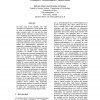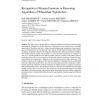180 search results - page 28 / 36 » Certain answers as objects and knowledge |
ICALT
2005
IEEE
14 years 1 months ago
2005
IEEE
For their usage in the semantic web, valid ontologies are required for a given domain. Here we focus on ontologies represented as concept maps (semantic nets). For one and the sam...
CIA
2006
Springer
13 years 11 months ago
2006
Springer
In this topical1 paper we try to give an analysis and overview of the current state of Semantic Web research. We point to different interpretations of the Semantic Web as the reaso...
INFORMATICALT
2010
13 years 4 months ago
2010
This paper analyses the possibilities of integrating different technological and knowledge representation techniques for the development of a framework for the remote control of mu...
CORR
2010
Springer
13 years 2 months ago
2010
Springer
We consider an opportunistic spectrum access (OSA) problem where the time-varying condition of each channel (e.g., as a result of random fading or certain primary users' activ...
SIGECOM
2004
ACM
14 years 29 days ago
2004
ACM
The revelation principle is a cornerstone tool in mechanism design. It states that one can restrict attention, without loss in the designer’s objective, to mechanisms in which A...


